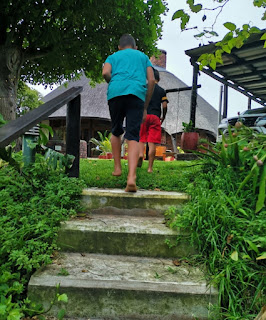We all know that 2020 has been a rough year. We were faced with
our own mortality, took a financial knock and many of us lost people close to
us due to the Covid-19 pandemic. We experienced different levels of lockdown, living
and learning online and we were exposed to media sensations. We questioned our
governments and some of us turned into conspiracy theorists. But as I look back
on my 2020, I realized that among all the losses experienced and fears faced, I
also gained new perspectives about my priorities and what is really important
in my life.
The importance of connection
We teachers literally had only a couple of weeks of school
to connect with the new children in our class, before lockdown came into
existence and forced us to learn to connect online. I was incredibly thankful
that we did have these few weeks of being together at the start of the year, as
it made it much easier to maintain my connection with my little people online.
But I missed the direct interaction and found adapting to this different way of
connecting challenging. On the home front my hubby, our two boys and I created
a new routine for us and made connecting a priority during this vulnerable
time. We cherished every day, deliberately made special memories and
purposefully made connecting with each other a priority.
Self-care is very
personal
It might seem to just be the new craze, but there really is
so much value to it. We get swallowed up by our busy lives and we forget to
stop, breathe and speak kindly to ourselves. Granted, self-care can also cause
more stress (which totally defeats the purpose) when we feel that we are falling
short and judge ourselves or others for not making time for self-care. But I
realized that self-care is a very personal act and that it will take different
forms for every human being. Your self-care practices have to adapt to who you
are and the life you live. Your self-care must suit your lifestyle and it must
feed your needs. For some of us self-care might be a long shower or bath and for
others cooking or reading. It may even be just taking a deep breath and
exhaling it slowly with our eyes closed or visiting with our best friend once a
week. It might be phoning your sister, playing a board game with your children or
taking the dog for a walk. I realized this year that self-care is not about
what activity I am doing, how frequently I get to practice it or even for how
long I am doing it. For me it is about having that moment, where I can pull
myself towards myself and take a conscious breath.
Polarity of change
Change is inevitable and it is not always easy. At times it
can feel like a curve ball that has hit you between the eyes. I think that
feeling overwhelmed by change, was a universal experience, that we all had to roll
with this year and will likely continue to face next year. Dealing with such a
large scale of change that impacted every facet of our professional and
personal lives has been challenging. Everyone’s jobs were affected in different
ways. Some of us lost our jobs, some of us created new jobs and some of us
learned new skills as we were forced to adapt the way we do our jobs. We also had
to change the way we interact with others and were faced with the significant
changes brought about by losing loved ones. It is easy to get lost in the long
list of changes we did not want and did not like this year. But I acknowledge
that there has also been positive changes that helped us become far more
conscious of our health and our environment. Our way of life has changed and
our perceptions and level of appreciation has changed too. We might not always
have control of the changes that come our way and at times they might
temporarily throw us off balance. Ultimately, the only choice we have is how we
respond to it and I realized how important this choice is, as our children are
watching and learning from us every step of the way.
Family is priceless
My family… my tribe… my favourite people… This year reminded
me of the incredible importance of family and to not take my people for
granted. It reminded me to cherish them, love them and protect them. It
reminded me that to be right or win an argument is really not that important.
And it reminded me that making special memories with the people I love, will last
me a life time.
So as I reflect on 2020, I choose to focus on what I have
gained this year and hope that I will never forget to adapt, connect, cherish my
family and close my eyes while exhaling.
















